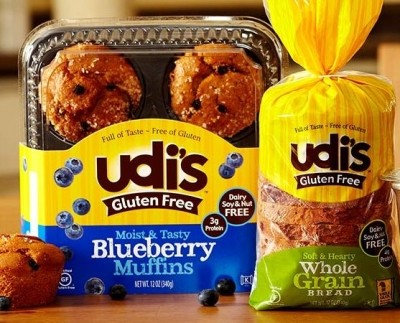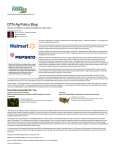Gluten free ‘most popular approach to weight loss’ for 2013 (but it doesn’t work, say dietitians)

According to a poll of more than 200 registered dietitians conducted by marketing and PR agency Pollock Communications, wheat belly/gluten free’ is predicted to be the “most popular approach to weight loss” in 2013, just ahead of commercial diet programs such as Weight Watchers and Jenny Craig.
"Dietitians were split down the middle, with wheat belly/gluten free (42%) beating out commercial diet programs (41%) by only one percent as the most popular approach to weight loss", said the agency.
Dietitians recognize this as a fad and a trend for 2013 among consumers

However, New York City-based RD Jenna A. Bell, PhD, told FoodNavigator-USA that the approach was not one that dietitians recommended as a weight loss tool, adding: “Consumers believe that gluten-free will help them lose weight, but the research does not support this claim.
“Dietitians recognize this as a fad and a trend for 2013 among consumers, but it's not a recommended strategy for weight reduction.
“That said, gluten-free foods have provided an important option for individuals suffering from a clinically diagnosed gluten intolerance or celiac disease.”
Asked for comment on the survey findings, Ryan O'Malley, media relations manager at the Academy of Nutrition and Dietetics, told us: “We don’t have an official position on gluten-free diets used as weight loss tools, but we do not recommend them for weight-loss.
“Rather we advise that only those that have a gluten intolerance or have celiac disease should eliminate gluten from their diets.”
People on gluten-free diets often gain weight
Speaking at October’s Whole Grains on Every Plate conference in San Antonio, Pamela Cureton, clinical research dietitian at the Center for Celiac Research, noted that celebrities such as Gwyneth Paltrow and Miley Cyrus continue to promote gluten-free diets for weight management - although there is “no scientific basis” behind the approach.
Indeed, she added, “people on gluten-free diets often gain weight as many gluten-free foods are quite calorie dense.
“Gluten-free diets are often higher in fat and lower in vitamin B12, zinc, iron and folate.”
As for top athletes, several of whom are now advocating gluten-free living, she said: “There is no evidence that a gluten-free diet will increase sports performance.”
There is no [validated] biomarker for gluten sensitivity
It is also important to stress that gluten sensitivity or intolerance, which is believed to affect up to 5-6% of Americans, is not the same as celiac disease, which is an auto-immune disorder which causes damage to the gut wall if not diagnosed, she said.
“People will gluten sensitivity will often have faster and more violent symptoms or reactions to gluten than celiacs, but they do not have the intestinal damage associated with celiac disease.”
Meanwhile, contrary to popular belief, “there is no [validated] biomarker for gluten sensitivity”, she claimed.
“We’re trying to find one, but there is a lot of misinformation out in the public about this.”
The conviction that gluten-free is healthier is the top motivation for purchase
According to data from SPINS, sales of gluten-free products were up 19% in the year to September 2012 in natural and conventional channels combined (excluding Walmart, Trader Joe’s, Whole Foods Market).
Mintel data meanwhile, shows that the number of new product launches featuring gluten-free claims rose from 600 in 2007 to more than 1,600 in 2011, while a report published this week from Symphony Consulting (a division of SymphonyIRI), reveals that sales of products making some kind of 'Dietary Restriction' claim such as gluten free or dairy free accounted for 33% of sales of products making an on-pack claim of some kind.
But what is driving the growth?
Asked why they buy gluten-free products in an August 2012 Packaged Facts consumer survey, 35% said gluten-free products are "generally healthier", 27% said "to manage my weight", 21% said that gluten free products are "generally low-carb" and 15% said a member of the household has a gluten or wheat intolerance.
Just 7% said they were buying them because a household member has celiac disease.
Indeed, according to Packaged Facts, "The conviction that gluten-free products are generally healthier is the top motivation for purchase of these products.”
Why is the prevalence of celiac disease rising?
According to Cureton, just under 1% of the US population is estimated to have celiac disease, less than 10% of which are diagnosed, she said.
“What we do know is that true prevalence of celiac disease is increasing, and this is not just because more people are getting diagnosed. Why this is, we still don’t know.”
Natural and simple are in; low-fat and low-carb are out
Other top diet and lifestyle trends identified by the dietitians in the Pollock Communications survey include:
- Natural and simple with few ingredients are in; low-fat and low-carb are out…
- Social media, smart phone apps and dietitians will be the go-to sources for nutrition information in 2013…
- Consumers will focus on eating high quality calories - foods with more nutrition per bite…
- Eating more fruits and vegetables

























